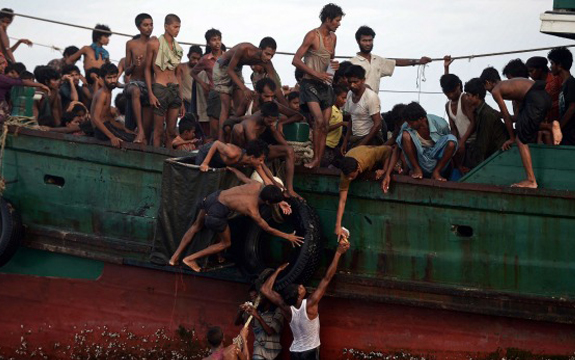Rohingya boat people crisis demands regional response

In Summary
Thousands of "boat people", many of them Rohingya, are currently marooned on dangerously overcrowded boats in the Andaman Sea. Malaysia, Indonesia and Thailand have all reportedly refuelled, reprovisioned and then turned back boats found in their countries' territorial waters.
Their response is reminiscent of that taken by south-east Asian countries in the late 1970s when hundreds of thousands of people fled Vietnam by boat. Then, Indonesian authorities, among others, refused to let boats land and sent them on their way to Australia. Malaysia, Indonesia and Thailand are also perceived to be emulating Australia's recent approach to "boat people" (although neither Asian nation has the resources to transfer the passengers of intercepted boats to $200,000 disposable lifeboats).
Australia's policy has also been hailed as a potential blueprint for a response to the "boat people" crisis in the Mediterranean Sea. Tens of thousands of irregular migrants have journeyed by boat from North Africa to Southern Europe this year alone. In the first four months of 2015, at least 1780 of them perished en route.
"It's time to get Australian", Katie Hopkins, a one-time contestant in a British television show, demanded in a column in the London Sun in April. "Bring on the gunships, force migrants back to their shores and burn the boats."
The federal government has also claimed to have had the answers. "Plainly, there is a terrible, terrible tragedy unfolding in the Mediterranean right now," Tony Abbott told journalists last month. "I suppose we must grieve for the loss but at the same time we must resolve to stop this terrible problem and the only way you can stop the deaths is … to stop the boats."
In recent weeks, the European Union held a series of crisis talks to formulate a joint response to the current emergency. The heads of governments met on April 23. And on Wednesday, the European Commission agreed on a "European Agenda on Migration."
In many respects, the EU's policy response and rhetoric do indeed resemble Australia's. The heads of government decided to increase the resources allocated to border protection. They promised to step up the fight against people smugglers and traffickers. They want to facilitate "the rapid return of illegal migrants from frontline member states".
But the EU's response is also very different. On Wednesday, the European Commission proposed to introduce a so-called emergency relocation quota system whereby asylum seekers would be distributed equitably across member states, with each being required to accommodate and process a certain proportion. A complicated formula, which takes into account a country's economic performance, its unemployment rate, its population, and the number of asylum applications and resettled refugees would be used to arrive at these percentage figures.
The Commission has also proposed an EU-wide refugee resettlement scheme. Again, each country would be obliged to resettle a certain number of people according to its capacity (as calculated by Brussels).
The significance of the European Commission's announcement can hardly be overstated. Admittedly, there is no guarantee that the policy announced this week will be implemented immediately. For that to happen, individual member states need to give their approval, and already a number of them, including Britain, have raised objections. But the fact remains that the commission has recognised the crucial importance of a concerted approach to the current crisis that takes into account the capacities of individual countries to accommodate asylum seekers and refugees.
Mind you, this is not a solution. It's an attempt to manage the current crisis. A solution would require that the root causes of irregular migration from Africa and the Middle East to Europe, including war and persecution, are addressed. Many of those currently trying to reach Europe by boat come from war-torn Syria and Somalia and from Eritrea, whose government subjects its own citizens to forced labour. Who could blame Syrians, Somalis and Eritreans for trying to escape their homelands?
Of course, the policy of turning back boats (or that of deterring refugees from seeking protection in countries that would detain them indefinitely and under inhumane conditions) does not address any root causes and can be no more than an illusory – and, in Australia's case, extraordinarily expensive – solution. But turning back desperate people does not constitute effective crisis management either, because it often only forces people to seek protection elsewhere.
A regional arrangement, however, whereby countries take responsibility for people fleeing their home countries in line with their individual capacities to do so, could work. Perhaps the EU will show Australia and its neighbours how.
In the meantime, irregular migrants are dying both in the Mediterranean and in the Andaman Sea. Britain, France and Germany have recently deployed navy frigates and patrol boats to help the Italian navy and coast guard conduct search and rescue missions. On Thursday, 2200 people were plucked from dinghies and rickety boats in the Mediterranean.
That same day, Thailand and Malaysia intercepted and turned back more than a thousand "boat people". Why couldn't Australia be the one to initiate and lead a regional response whereby the responsibility for rescuing, accommodating, processing and, if necessary, resettling irregular migrants is shared equitably?
Such a response, however, can only be a first step. A solution would have to entail more, such as the protection of, and citizenship rights, for Rohingya. Here, too, Australia could play a role by advocating their case with the government of Myanmar.
Klaus Neumann is professor of history at Swinburne University of Technology. His book Across the Seas: Australia's Response to Refugees: A History was just published by Black Inc.

